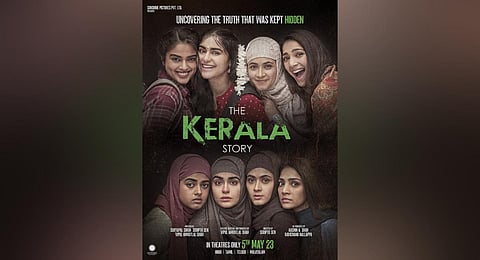

First things first, in a film titled The Kerala Story, one would naturally expect a bit of Kerala in it. Save for some quintessential shots of the backwaters, lush greenery, and, of course, Kathakali artists, there is very little in the film to convey that it’s actually a story set in Kerala.
For some strange reason, the Keralites in the film speak predominantly in Hindi, and when they occasionally slip into Malayalam, it’s unintentionally hilarious. In a supposedly poignant moment, a character says, “ennod kshemikku amme” (forgive me, mom), but the Malayalam dubbing is so shoddy that it’s heard, “ennod kshemikku ammayi” (forgive me, aunty). It seems the focus was more on making the Malayali characters pronounce words like ‘aunty’ as ‘andy’ and ‘country’ as ‘kandry’.
The film’s lead character Shalini Unnikrishnan alias Fathima (Adah Sharma) is loosely based on Nimisha Sampath, a Malayali BDS student who later converted to Islam and became Fathima Isa. Nimisha’s shocking story became public after she surrendered in Afghanistan. The Kerala Story’s narrative begins at this point with Shalini, lodged in an incarceration centre, recounting how her life took a turn after joining a nursing college in Kasargod. Perhaps, in an attempt to establish Kasargod as a Muslim-dominated region, she first arrives at the campus in an auto named Mashallah.
The campus walls are decorated with slogans of ‘Free Kashmir’ and graffiti supporting Osama bin Laden. Shalini’s roommates in college are from different faiths—Nimah is a Christian, Asifa is a Muslim, and Geetanjali, a Hindu raised by an atheist father.
Asifa is part of a nexus that converts and radicalises women. She gets into action soon by feeding them the values of Islam and the greatness of Allah. One of the very few interesting stretches in the film shows how Shalini and Geetanjali embrace the Hijab because they feel protected. In the pretext of love, the naive women are drugged, impregnated, and eventually trapped.
Director Sudipto Sen, who has co-written the film with Suryapal Singh and Vipul Amrutlal Shah, shows no subtlety whatsoever. His characters share information with the audience rather than conversing between themselves.
Over a cup of chai and smoke, we see terrorists talk about why they can’t trust Pakistan anymore and why they should distance themselves from outfits like Al-Qaeda and the Taliban. The makers show their true colours as they unapologetically portray every Muslim character in the film as a fanatic. They are shown demeaning other religions and instilling a fear of Allah in them.
Except for a taqiyah-wearing character, who accompanies the victims’ parents during a police interrogation, I don’t remember seeing a single Muslim character with an ounce of goodness in this film. In a restaurant scene, Shalini and Geetanjali are surprised to see Nimah and Asifa praying before eating.
It is followed by a lecture on how the Hindu girls are shown to be ignorant towards their religion. In another scene, after Geetanjali escapes from converting, she blames her communist father for following some ‘vidheshi’ ideology without respecting ‘our culture and religion’. It is quite funny that a film that speaks incessantly about brainwashing does the same with its target audience.
The makers claim the film is inspired by the stories of Kerala women (earlier 32,000... now 3), who get converted, radicalised, and recruited by the terror outfit, ISIS. There are a lot of other similar claims in the film, like 30,000 girls going missing in the state and the involvement of Keralites in blasts in Sri Lanka, Afghanistan, and Singapore.
Do they have valid findings to back these claims? They’ll probably say, ‘Error 404...Website not found’. The film ends with real footage of one of the victims and another’s parents sharing their harrowing experiences. It’s unfortunate what they went through, but it’s also true that their stories deserved a better film that didn’t have such dubious intentions.
Director: Sudipto Sen
Cast: Adah Sharma, Yogita Bihani, Sonia Balani, Siddhi Idnani
Rating: 1 out of 5 stars